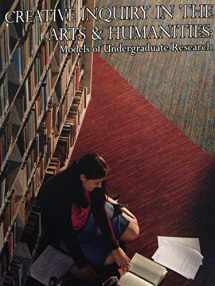
Creative Inquiry in the Arts and Humanities: Model
ISBN-13:
9780941933476
ISBN-10:
0941933474
Author:
Gregory Young, Jenny Olin Shanahan, Naomi Yavneh Klos
Publication date:
2016
Publisher:
The Council on Undergraduate Research
Format:
Paperback
139 pages
FREE US shipping
Book details
ISBN-13:
9780941933476
ISBN-10:
0941933474
Author:
Gregory Young, Jenny Olin Shanahan, Naomi Yavneh Klos
Publication date:
2016
Publisher:
The Council on Undergraduate Research
Format:
Paperback
139 pages
Summary
Creative Inquiry in the Arts and Humanities: Model (ISBN-13: 9780941933476 and ISBN-10: 0941933474), written by authors
Gregory Young, Jenny Olin Shanahan, Naomi Yavneh Klos, was published by The Council on Undergraduate Research in 2016.
With an overall rating of 3.5 stars, it's a notable title among other
books. You can easily purchase or rent Creative Inquiry in the Arts and Humanities: Model (Paperback) from BooksRun,
along with many other new and used
books
and textbooks.
And, if you're looking to sell your copy, our current buyback offer is $0.3.
Description
Creative Inquiry in the Arts & Humanities: Models of Undergraduate Research aims to assist faculty and administrators of any academic discipline who are creating undergraduate research opportunities that move beyond the natural and social sciences, as well as those working to sustain well-established, multidisciplinary programs. It offers examples of successful programs, assignments, curricula, journals, and conferences that support the research, scholarship, and creative activity of students in arts and humanities disciplines. Those examples cover a diversity of students' scholarly and creative work, including individual and collaborative writing, oral presentations, works of visual art, scholarly compilations, exhibits, musical compositions, plays, performances, public scholarship, and publications in many different forms. Those who mentor undergraduate research in the arts and humanities know the challenges of working with student researchers in disciplines in which solitary scholarship and individual creative processes are the norm. This work simply cannot, and should not, replicate a scientific model that utilizes teams of researchers, pooled data, and calibrated methods. Student research in the arts and humanities must reflect the kinds of work that scholars do in those fields. But which skills and bases of knowledge can mentors impart to students who do not have access to archives and special collections, who do not read classical languages, or who are just beginning to learn techniques that scholars in the field have mastered? How can faculty find the time to mentor individual student researchers when they are responsible for teaching hundreds of students every semester? Is it wise for faculty to invest that time in their undergraduate students' research when they need to publish their own work for tenure and promotion?


We would LOVE it if you could help us and other readers by reviewing the book
Book review

Congratulations! We have received your book review.
{user}
{createdAt}
by {truncated_author}


